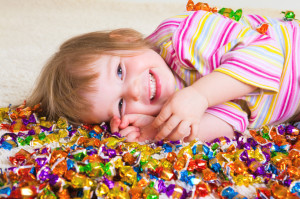Food Rewards - How to Get Your Child to Behave Without Them
/I was happy to meet Julie recently. She's a child behaviour and discipline specialist. As soon as I met her I knew that she would be the perfect person to answer a question that parents often ask me. You see, I teach (based on the research) that it's not good to use food as a bribe or reward for kids behaviour. So parents would ask me for alternatives. And that's where I hit the end of my expertise - I'm a child-feeding expert - not a child behaviour expert. Read on to see what Julie recommends as alternatives to food for teaching kids to have good behaviour.
Enjoy! Kristen
- Chocolate to stop crying.
- Dessert if you finish all of your dinner.
- Candy to buy a few extra minutes of peace & quiet.
Why Food Rewards Are A Bad Idea
Parents give food rewards to their children because it works……for the short term, plain and simple. However, the long term effects on the child may include poor appetite management, low self-esteem and distorted food control because they have now associated food with negative behaviour and/or pain. This learned behaviour could possibly leave your child with a potential food addiction which can carry right on through the teen years and well into adulthood.
There are many other ways to encourage your children to do what you expect of them without bribes, threats or rewards. Add more options to your Parenting toolbox so you are not left with food rewards as your only option.
5 of our BEST BEHAVIOUR Techniques (Without Food Rewards)
- Expectations & Routines – create routines throughout the day with your expectations in them
- Visuals – create a chart, poster or picture for each routine & reference them throughout the day
- Choices – offer your child at least 2 things to choose from instead of just demanding something
- Follow through – what you say…..you do!
- Consistency - say & do the same thing each and every time the same behaviour shows up
Try all 5 together for the BEST RESULTS!
Find out more on this topic and many others at www.missbehaviour.ca.
Learn about Julie Romanowski, Mom, Early Childhood Consultant & owner of
Miss Behaviour: parenting coach & consultant service.
"CHILDREN'S BEHAVIOUR & DISCIPLINE SPECIALISTS!" behaviour - discipline - tantrums - communication - interactions - daily routines – solutions



 Hallowe’en is a fun and exciting holiday for kids. And, while as a parent you may not love the idea of all that Halloween candy, the last thing that you want to add to an already hectic day is a battle over food.
Here’s some ideas about how to handle all that Halloween candy.
Hallowe’en is a fun and exciting holiday for kids. And, while as a parent you may not love the idea of all that Halloween candy, the last thing that you want to add to an already hectic day is a battle over food.
Here’s some ideas about how to handle all that Halloween candy.